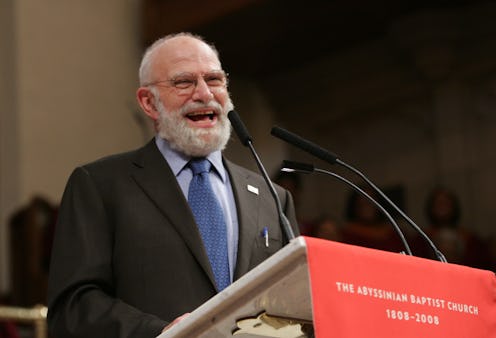News
4 Truths Oliver Sacks Taught Us About Life
Acclaimed and much-loved neurologist and author Oliver Sacks has died at 82, following a public and heartbreakingly self-aware fight with cancer. Sacks, like so few academics and scientists, was able to span the popular and professional divide, producing works that captured the imaginations of millions. Though you should definitely read some of Sacks' original works if you can, you don't need to become an expert to appreciate the man's renowned capacity for storytelling, subtlety, factual accuracy, and non-navel gazing introspection. It was a rare combination indeed.
It seems, at least, that Sacks was at peace with what was about to become his legacy, which is among the richest ever left by a single person. But the beauty of leaving a legacy of knowledge is that it can continue to grow long after you are gone. Today, on the actual and metaphorical Sabbath Sacks eloquently spoke about, he rests. But the rest of us still have at least some time left to learn, and there is no shortage of truths that Oliver Sacks taught us to start with. As someone who managed to hold both a deeply realistic and deeply optimistic view of humanity (no small feat), I think it is what Sacks would have wanted.
1. You can channel your passions productively.
In a New York Times essay he penned in February announcing that he was dying, Sacks explained that he was "a man of vehement disposition, with violent enthusiasms, and extreme immoderation in all my passions." Sacks channeled this passion into work that was both professionally and personally satisfying, and which gave shape to his life. Maybe we all can find a way to turn our faults into positives, too.
2. Science isn't dispassionate.
Sacks had a creativity about human experience and pharmacology that came, in part, from his own copious drug usage earlier in life. He studied face blindness because he had suffered from this inability to recognize people since childhood and knew full well how it could impact social functioning. Sacks studied migraines — he had those too. Conducting solid science does rely on espousing a certain kind of objectivity, but it doesn't mean leaving your personal experiences at the door.
3. Caring about things doesn't mean you have to wear yourself out.
Sacks explained in his New York Times cancer announcement that he cares very deeply about the future and large problems like global warming, but that he can't personally be troubled by them anymore. However, I think his attitude of caring when it counts started much earlier than a few months ago. Much of Sacks' work was about people and conditions that are sort of rare. He lived his best life by focusing on where he could add insight, because focusing on everything in the end means you've focused on nothing. Sacks understood the limits of what one person could do, and then worked right up to their edge.
4. Life gets better.
It can be hard to believe, especially for people who are still young, but Sacks put eloquent words to the idea that life gets better as you age, not worse. He referred to the time around his 30s as his "lost years," and, even having learned he was about to die, proclaimed he felt more alive than ever. There is plenty of scientific evidence that old people are happy, but Sacks told his own story as well as he had told other people's, and made it real for us. Though his legacy remains, the man himself will be missed.
